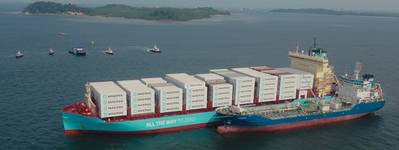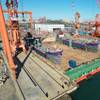Singapore Completes First Methanol Bunkering
Maersk and Hong Lam Marine have conducted the world’s first ship-to-container ship methanol bunkering operation of a Maersk’s container vessel at the Raffles Reserved Anchorage in Singapore.
This was also Singapore’s first methanol bunkering and it was conducted with the support of the Maritime and Port Authority of Singapore (MPA), government agencies and research institutes.
Maersk’s container vessel – the world’s first container vessel sailing on green methanol – was successfully refuelled with approximately 300 metric tonnes of bio-methanol via Hong Lam Marine’s Singapore-registered tanker, MT Agility, for its onward maiden passage to Copenhagen. MT Agility had earlier taken bio-methanol stored at Vopak Terminals.
The container vessel will be named in a ceremony in Copenhagen in September.
In preparation for the methanol bunkering operation in Singapore, MPA worked with over 28 agencies, partners and institutes to organise table-top exercises and workshops, before carrying out a Ground Deployment Exercise. A Hazard Identification (HAZID) and Hazard and Operability Study (HAZOP) workshop was conducted to identify potential risks and develop corresponding prevention, control, and mitigation methods. A customised methanol firefighting program was also conducted by the Co-operative of SCDF Employees Ltd (COSEM) for MPA staff and Hong Lam Marine crew members as part of the preparations for the bunkering operation.
As part of the risk and environmental impact assessment for the methanol bunkering operation, MPA reviewed methanol-related incidents globally and worked with the Meteorological Service of Singapore to provide advance lightning risk warning if required.
A methanol plume model was jointly developed by the Institute of High Performance Computing (IHPC), A*STAR, Tropical Marine Science Institute (TMSI), National University of Singapore, and the Technology Centre for Offshore and Marine, Singapore (TCOMS), to forecast the dispersion path of the methanol plume in an event of an accidental methanol release and guide operations. The model is a combination of dispersion in the air layer using computational fluid dynamics by IHPC, weather forecast and air quality modelling by TMSI, and plume dispersion in the sea via metocean modelling and prediction by TCOMS.
During the methanol bunkering operation, researchers from the Cambridge Centre for Advanced Research and Education in Singapore flew drones equipped with methanol detector with plume modelling capabilities and infrared camera from MPA’s patrol craft MPA Guardian to augment the detection of potential methanol leaks into the atmosphere and methanol flames in an event of an accidental leak.
These novel capabilities will be further enhanced to support the review of responses to maritime incidents and raise the preparedness of seafarers, marine professionals, and the port ecosystem in Singapore as new marine fuels such as methanol are introduced.
A Technical Reference (TR) for methanol bunkering is being developed by MPA in consultation with the Standards Development Organisation at Singapore Chemical Industry Council (SDO@SCIC). The TR will cover the refuelling requirements, operational and safety requirements for delivery of methanol from a bunker tanker to receiving vessels, crew training and competency. Best practices learnt from this bunkering operation will also inform the development of specialised bunker vessels, mass flow meters, digital bunkering and other standards.
MPA will continue to develop other operational and safety protocols, licensing requirements, training of seafarers and professionals, and study infrastructure needs such as terminal facilities and methanol carrying bunker tankers, to fully operationalise methanol bunkering. Experience gained from the bunkering operation will also be presented to partners and international bodies such as the IMO later this year to support the safe adoption of methanol as a marine fuel.
More methanol bunkering operations are being planned in the coming year as methanol-enabled vessels are delivered globally.













